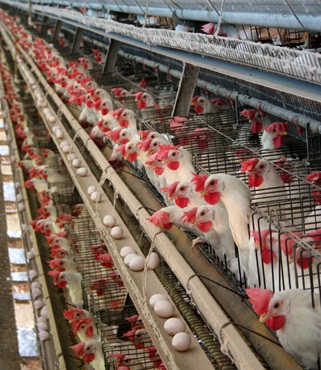Parmita Uniyal
New Delhi: The government has identified 12 epicentres of Avian Influenza (AI) viruses across four states and stepped up vigil to contain the spread of the disease from affected birds to poultry and humans.
In an official statement on the status of bird flu in the country, the Centre has also noted that there is no direct evidence that avian influenza viruses can be transmitted to humans through consumption of contaminated poultry products.
The advisory came amid general apprehensions linking the spread of virus through consumption of chicken and eggs. Despite this, share price of leading meat processing firms Venkys and Simran Farms slid 5.73% and 4.95% respectively on the BSE in the afternoon trade around 2PM.
“Implementing management practices that incorporate bio-security principles, personal hygiene, and cleaning and disinfection protocols, as well as cooking and processing standards are effective means of controlling the spread of the AI viruses,” the government statement noted.
The 12 epicentres of the bird flu have been identified in the states of Rajasthan, Madhya Pradesh, Himachal Pradesh and Kerala. Some of the key places where virus has spread are Baran, Kota, Jhalawar, Mandsaur, Indore, Malwa, Kangra, Kottayam and Allapuzha.
While virus was confirmed in samples taken from crows in Rajasthan and Madhya Pradesh, in the hill state of Himachal Pradesh the same was confirmed in samples from migratory birds.
In Kerala, positive virus samples were confirmed in poultry and duck.
“In India, the disease spreads mainly by migratory birds coming into India during winter months i.e. from September-October to February-March. The secondary spread by human handling (through fomites) cannot be ruled out,” said Ministry of Fisheries, Animal Husbandry & Dairying in a press note.
As cases of bird flu were reported in various states, the Centre issued advisories to contain the disease. The states have been advised to take measures for stopping the virus from spreading to poultry.
The Department of Animal Husbandry & Dairying has also set up a control room in the national capital to keep a close watch on the situation and to take stock on daily basis of preventive and control measures undertaken by state authorities.
The measures suggested by the Centre to affected states include strengthening the biosecurity of poultry farms, disinfection of affected areas, proper disposal of dead birds/carcasses, timely collection and submission of samples for confirmation and further surveillance.
The forest departments in various states have been asked to report any unusual mortality of birds.
As per World Organization for Animal Health (OIE), avian influenza is defined as an infection of poultry caused by any influenza A virus of the H5 or H7 subtypes or by any influenza A virus with an intravenous pathogenicity index (IVPI) greater than 1.2.
The viruses have been circulating worldwide for centuries with four known outbreaks recorded in the last century.
The present wave of highly pathogenic avian influenza (HPAI) emerged first in Hong Kong in 1997. India notified the first outbreak of avian influenza on 18th February, 2006. Since then, outbreaks have been reported in Maharashtra, Gujarat, Madhya Pradesh, Manipur, West Bengal, Meghalaya, Karnataka, Bihar, Chhattisgarh, Tripura, Assam, Sikkim, Odisha, Kerala and Chandigarh.

